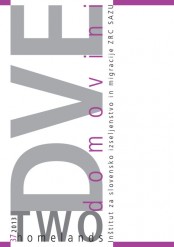Self and Other – Representations of the Korean Minority in Japan
Keywords:
Japan, Korean minority, nationality, representations, expression of identityAbstract
This paper focuses on the study of the diversity, mutual representations and the expression of identity of the Korean minority in Japan, which occurs through the assertion of their existence and value in a foreign country, through an analysis of the problems of their lack of recognition, and through giving them voice. The question of identity in general and national and ethnic identity in particular requires not just the identification of the subject with a specific space as home, but also the examination of the process of production and reproduction of such an identity. The paper focuses on the problems that the minority group of resident Koreans has with understanding, expressing and representing their identities.
Downloads
References
Chapman, David (2008). Zainichi Korean Identity and Ethnicity. London and New York: Routledge.
Fukuoka, Yasunari (2000). Life of Young Koreans in Japan. Melbourne: TransPacific Press.
Fukuoka, Yasunari, Tsujiyama, Yukiko (1991). Dōka to ika no hazama de. “Zainichi” wakamono sedai no aidenteitei kattō. Tōkyō: Shinkansha.
Hall, Stuart (1992). The Question of Cultural Identity. Modernity and Its Futures (eds. David Held Hall, Anthony McGrew). Cambridge: Polity Press, 274–316.
Hall, Stuart (ed.) (2002). Introduction, and the Spectacle of the ‘Other’. Representation: Cultural Representations and Signifying Practices. London, Thousand Oaks, New Delhi: Sage Publication, 1–12, 223–290.
Hashimoto, Miyuki (2010). Zainichi Kankoku, Chōsenjin no shinmitsuken: haigūsha sentaku no sutōri kara yomu “minzoku” no genzai. Tōkyō: Shakai Hyōronsha.
Inadsugi, Tadashi (2002). Zainichi Kankoku, Chōsenjin no shakai idō. Minzoku kankei ni okeru ketsugō to bunri (ed. Tomio Tani). Tōkyō: Minerva, 559–595.
Iwabuchi, Koichi (2005). Political Correctness, Postcoloniality, and the Self-representation of “Koreanness” in Japan. Koreans in Japan. Critical Voices from the Margin (ed. Sonia Ryang). London and New York: Routledge Curzon, 55–73.
Kashiwazaki, Chikako (2005). The Politics of Legal Status. The Equation of Nationality with Ethnonational Identity. Koreans in Japan. Critical Voices from the Margin (ed. Sonia Ryang). London and New York: Routledge Curzon, 13–31.
Lee, Dong-Hoo (2012). Media Discourses on the Other: Japanese History Textbook Controversies in Korea, http://www.media-ecology.org/publications/MEA_proceedings/v3/Lee03.pdf (17 October 2012).
Lie, John (2005). Ordinary (Korean) Japanese. Koreans in Japan. Critical Voices from the Margin (ed. Sonia Ryang). London and New York: Routledge Curzon, 197–207.
Macdonald, Gaynor (1995). The Politics of Diversity in the Nation-State. Diversity in Japanese Culture and Language (eds. John C. Maher, Gaynor Macdonald). London and New York : Kegan Paul International, 291–315.
McLelland, Mark (2008). “Race” on the Japanese internet: discussing Korea and Koreans on “2-channeru”. New Media Society 10/6, 811–829.
Oh, Miyoung (2009). “Eternal Other” Japan: South Koreans’ Postcolonial Identity. The International Journal of the History of Sport 26/3, March, 371–389.
Ryang, Sonia (ed.) (2005a). Introduction: Resident Koreans in Japan. Koreans in Japan. Critical voices from the margin. London and New York: Routledge Curzon, 1–12.
Ryang, Sonia (2005b). How to Do or Not Do Things With Words: The Case of Koreans in Japan. Asian Ethnicity 6/3, October, 223–236.
Pakhomov, Oleg (2011). Re-entered Communities: Ethnic Discrimination Risk Management of the Korean Diaspora in Russia, the United States, and Japan. PhD Dissertaion. Kyoto: University of Kyoto.
Song, An-Jong (2009). Zainichi ongaku no 100 nen. Tōkyō: Seidosha.
Tai, Eika (2006). “Korean Japanese”. Critical Asian Studies 36/3, 355–382.
Tani, Tomio (ed.) (2002). Minzoku kankei ni okeru ketsugō to bunri. Tōkyō: Minerva.
Weiner, Michael (ed.) (2009, 1997). “Self” and “other” in imperial Japan. Japan’s Minorities. The Illusion of Homogeneity. New York: Routledge, 1–20.
Downloads
Published
How to Cite
Issue
Section
License

This work is licensed under a Creative Commons Attribution-NonCommercial-NoDerivatives 4.0 International License.
Authors guarantee that the work is their own original creation and does not infringe any statutory or common-law copyright or any proprietary right of any third party. In case of claims by third parties, authors commit their self to defend the interests of the publisher, and shall cover any potential costs.
More in: Submission chapter





